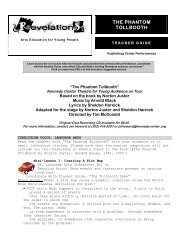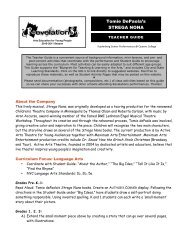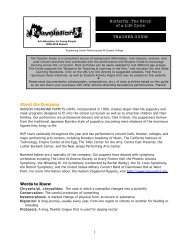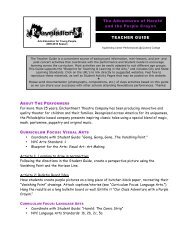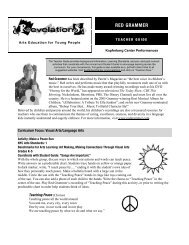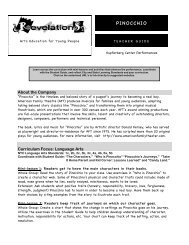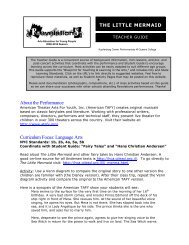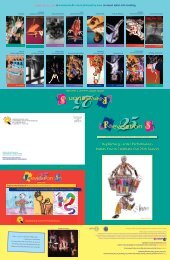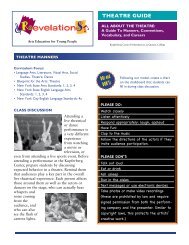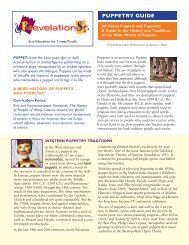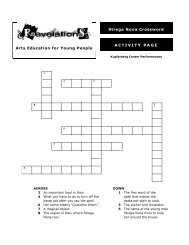FRINDLE - Kupferberg Center Performances
FRINDLE - Kupferberg Center Performances
FRINDLE - Kupferberg Center Performances
You also want an ePaper? Increase the reach of your titles
YUMPU automatically turns print PDFs into web optimized ePapers that Google loves.
Arts Education for Young People<br />
2011-2012 Season<br />
1<br />
<strong>FRINDLE</strong><br />
TEACHER GUIDE<br />
<strong>Kupferberg</strong> <strong>Center</strong> <strong>Performances</strong> @ Queens College<br />
The Teacher Guide is a convenient source of background information, mini-lessons, and pre- and<br />
post-concert activities that coordinate with the performance and Student Guide to encourage<br />
learning across the curriculum. Most activities can be easily adapted to suit different age groups.<br />
This Guide supports the “Blueprint for Teaching & Learning in the Arts,” and includes City and State<br />
Learning Standards. Click on the URL’s to link directly to suggested websites. Feel free to<br />
reproduce these materials, as well as Student Activity Pages that may be posted on this website.<br />
!<br />
Please send documentation (photographs, compositions, etc.) of class activities based on this guide<br />
so we can share your successes with other schools attending Revelations performances. Thanks!<br />
About the Performance<br />
Synopsis: Nick Allen is a smart (some might say smart-alecky) fifth grader with a gift for<br />
creative ideas and a reputation as a bit of a troublemaker. After all, who could forget his<br />
third-grade prank, spreading sand all over the classroom to turn it into a beach party on<br />
a tropical isle? When Nick coins a new word for pen—frindle—all he wanted to do was<br />
play a little trick on Mrs. Granger, the strict, no nonsense language arts teacher with a<br />
passion for homework, dictionaries and proper vocabulary. After all, Mrs. Granger was<br />
the one who told the class that it was ordinary people who determined what words mean,<br />
and which words ended up in the dictionary. But what starts out as Nick’s attempt to<br />
avoid having homework, grows into a power struggle between him and Mrs. Granger.<br />
Theirs is a conflict about what makes a real word, and neither is willing to concede to the<br />
other. What starts as a classroom prank spreads through the school and eventually<br />
becomes a nation-wide craze (first it’s a story in his hometown newspaper, then an item<br />
on TV news, then the hot topic on the cable and network talk shows). Nick fears that<br />
with frindle he may have unintentionally created a monster he can no longer control.<br />
About the Author: Andrew Clements has written over 50 books for young readers,<br />
including the best seller, Frindle (1996), which has more than 2-million copies in print.<br />
Clements says that Frindle is about “discovering the true nature of words, language,<br />
thought, community, learning. It’s also about great teaching and great teachers, and<br />
about the life that surges through corridors and classrooms every school day.” Talking<br />
about the characters, Clements adds that Frindle includes “a lot of material drawn from<br />
my own experiences as a kid and a teacher and a parent. Nick is a combination of many<br />
kids I have known—girls and boys—and myself. Mrs. Granger is also constructed from<br />
bits of many teachers I have known and worked with.”<br />
Clements has won children’s choice awards in over 22 states and has been the recipient<br />
of the Christopher Award and an Edgar Award for Best Juvenile Mystery. An avid booklover<br />
since childhood even before he turned to writing at age 35, Clements was a teacher<br />
and then a children’s book editor. He and his wife live in Massachusetts; they have four<br />
grown children. Visit www.andrewClements.com for more about Frindle and his other<br />
books.
About the Artists: William Massolia, The Griffin Theatre Company’s Artistic Director,<br />
adapted Frindle for the stage. Based in Chicago, Griffin Theatre Company creates<br />
meaningful theatrical experiences for both children and adults. Their plays build bridges<br />
of understanding between generations and instill in audiences an appreciation of the<br />
performing arts. The company produces literary adaptations, original works and classic<br />
plays, and is supported by an ensemble of Artists in Residence with a range of disciplines<br />
that include acting, designing, directing, and production. Their programming for young<br />
people is devoted to original productions of award-winning children’s literature and last<br />
year its touring company performed for over 100,000 youngsters and adults. Visit them<br />
at www.griffintheatre.com.<br />
Vocabulary<br />
The play and novel contains a number of words that might be unfamiliar to some<br />
students and which you may wish to review.<br />
Antonym boycott coinage contract<br />
detention disrespectful etymology fad<br />
lexicology linguistics maverick media<br />
scholarship synonym trademark trust fund<br />
All About The Theater<br />
For a lesson on theater etiquette, theatrical conventions, theater vocabulary and careers<br />
please download the Revelations Theater Guide from our website: Go to<br />
kupferbergcenter.org/revelations and click on “Teacher Guides.”<br />
Curriculum Focus: Language Arts, Theater Arts, Visual Arts, Problem-Solving,<br />
Relationships<br />
Coordinates with Student Guide: “About the Performance”<br />
Blueprint for the Arts: Theater<br />
New York State Arts Standards: 1, 2, 3<br />
New York State English Language Arts Standards: 1, 2, 3<br />
New York City English Language Standards: 2b, 3c, 4a, 5a, 5b<br />
Lesson: Elements of a Play<br />
Discuss the elements that make up a play, such as plot, themes, characters, language,<br />
visuals (scenery, costumes, props), staging, etc. How were these elements used in<br />
Frindle? What do the students remember about the performance—such as how the<br />
actors were dressed, what specific actions the characters took, what was the scenery<br />
like? Younger students can make a vocabulary list of the words they would use to<br />
describe these things.<br />
Discussion: Post-Performance Review<br />
After seeing the show, discuss the story with the class. Ask them to share their thoughts<br />
about the production. Here are some sample questions to pose:<br />
• Who were the main characters in the play?<br />
• What problems did they have?<br />
• How did they go about solving these problems?<br />
• Would you solve these problems in the same way?<br />
• What were some of the themes of the play?<br />
2
• Were the characters and situations believable?<br />
• Was the sequence of events interesting? Surprising? Why?<br />
• What parts did they like the best? Least? Why?<br />
• Were there scenes or events that they did not understand?<br />
• Did they think the play’s ending was appropriate?<br />
• If they were the director of the play was there anything they would change?<br />
• How did the audience react to the play?<br />
Alternative Assignment: Instead of a discussion, this can be a writing assignment: ask<br />
students to write a review of the play based on the above questions, backing up their<br />
opinions. Encourage students to illustrate their reviews with a drawing, painting or<br />
diorama of their favorite scene from the play. Have students read their reviews to the<br />
class and show their artwork. Use the reviews and artwork for a bulletin board display.<br />
Send some to The <strong>Kupferberg</strong> <strong>Center</strong> for inclusion on the Revelations website.<br />
Activity: Letter-writing<br />
Review with class how to write a letter. Then have them write a fan letter to their favorite<br />
character/actor in the play. Tell them what part of the play you liked best. Read the<br />
letters aloud.<br />
Activity: Research<br />
Nick changes the world when he’s not yet a teenager. Have students research someone<br />
who made a contribution to music, literature, science, sports or another field while still<br />
very young and write a short biographical sketch of the person they select. If possible,<br />
include an illustration of their contribution.<br />
Discussion: What other popular novels do the student’s think would make an<br />
interesting play adaptation?<br />
Activity: Creating Ads<br />
Have students create a newspaper ad about the play. Compile a list of adjectives and<br />
verbs (with their definitions) that might be used in such an ad. Discuss the differences<br />
between a critic’s review/opinion about a play and an advertisement about the same<br />
play.<br />
Curriculum Focus: Problem Solving, Interpersonal Relationships, Families &<br />
Communities, Language Arts<br />
Coordinates with Student Guide: “About the Performance”<br />
New York State English Language Arts Standards: 1, 2, 3, 4<br />
New York City English Language Standards: 2b, 2c, 4a, 5a<br />
Discussion/Activity: Perseverance and Conflict<br />
Abraham Lincoln said, “Be sure you put your feet in the right place, then stand firm.”<br />
Open up a discussion of this quote and about having the courage to stand up for yourself<br />
and your convictions (like Nick in the play) when facing opposition. Then ask students to<br />
write an essay or story about a real or fictional person who decides not to back down in<br />
defense of their beliefs or something he or she thinks is worth fighting for (someone like<br />
Rosa Parks, perhaps). Have students read their work and continue discussion about<br />
quote.<br />
3
Discussion: Two of the themes in the play are perseverance (both Nick and Mrs.<br />
Granger hold steady in their attitudes about the meaning of words) and conflict (they<br />
have an on-going disagreement). Ask students what they think perseverance means.<br />
• Are there times when it is a bad idea not to back down, or is it always good?<br />
• If there are times when it is inappropriate, how can you tell the difference between<br />
those times and the times it is good?<br />
• Is it always a good idea to “stick to your guns” and stand up for something you<br />
believe in and not back down, even when there is opposition.<br />
• Are there times when it’s inappropriate? If not, why not.<br />
• Is conflict always bad? Are there any ways that conflict can be handled to have<br />
positive results? If so, how?<br />
• Are there things or ideas that are worth fighting for? Ask students if there was<br />
ever a time when they (or someone they know) stood up for what they thought was<br />
right. What happened?<br />
• How do the characters in the play handle these conflicts?<br />
• What do you students think they would do in a similar situation?<br />
Activity: Writing Assignment<br />
• Have students interview an adult about perseverance. Who or what helped them<br />
to “stay strong.”<br />
• Ask students to write an essay based on the class discussion above, about<br />
conflict.<br />
Discussion: Fix It, Change It, Do Something New<br />
Are there things in the school or the community that students feel strongly about and are<br />
willing to try to change? Have students compose a Letter to the Editor or an Op-Ed piece<br />
describing the problem or the change they want and how they would go about creating a<br />
solution.<br />
Discussion: Turning Ideas into Action<br />
Nick is known for his great ideas, especially ways to make school more fun. Ask the<br />
class to come up with ideas to make their school better. How would they turn their ideas<br />
into concrete actions?<br />
Activity: Writing Assignment<br />
In the play (and in the novel), Mrs. Granger inspires Nick to learn about words and this<br />
changes his life for the better. Ask students to write an essay about a person who<br />
influenced their life in a positive way. What lessons did that person teach them? Or, ask<br />
class to compose a letter that an adult Nick might write to Mrs. Granger about how she<br />
influenced his life.<br />
Discussion: Recognizing Different Viewpoints<br />
Ask students if they’ve ever felt picked on or treated unfairly by a parent, or teacher or<br />
other authority figure. Were they ever able to see how this person might have been trying<br />
to help them, not hurt them?<br />
Curriculum Focus: Reading<br />
Coordinates with Student Guide: “About the Author”<br />
Blueprint for the Arts: Theater<br />
New York State English Language Arts Standard: 3<br />
4
New York City English Language Standard: 2b<br />
Activity/Discussion: Novel vs. Play<br />
After the performance, have the class read the novel on which the play is based. When<br />
they’ve completed this assignment, discuss similarities and differences between the book<br />
and the play.<br />
• Discuss the word “adaption” as it pertains to theatrical works.<br />
• Do students think the play retained the spirit and tone of the book?<br />
• Why do students think the novel has been so popular?<br />
• Do they think what happens is the book (and the play) could happen in real life?<br />
Extension: Ask students to read another of Andrew Clements’ novels and do an<br />
illustrated book report.<br />
Curriculum Focus: Language Arts<br />
Coordinates with Student Guide: “Some Words about Words” and<br />
“Some Words about Dictionaries”<br />
New York State English Language Standards: 1, 2, 4<br />
New York City English Language Standards: 2a, 3d<br />
Activity: Learn a Word a Day<br />
Ask students to learn a new word a day and keep a word notebook and enter the word,<br />
with its definition and etymology. Use the word in a sentence. Students can create a<br />
personal dictionary of newly learned words by stapling sheets of paper together, one<br />
sheet for each letter of the alphabet and entering their words on the appropriate page.<br />
Activity: Ask students to select one of the persons quoted in Some Words About Words<br />
or mentioned in Some Words About Dictionaries. Research that person’s life and write a<br />
short biography.<br />
Coordinates with Student Guide: “What’s a Neologism?”<br />
Activity: Research<br />
Have the class research different kinds of neologisms and compile lists of words and<br />
phrases that have entered the English language in the last 20 years. Be sure to include<br />
definitions and pronunciation guides. Examples:<br />
• Words that have come from the words of literature, science, and popular culture:<br />
muggles, chatroom, couch potato, laser.<br />
• Portmanteau words: brunch, pixel, telethon, smog, and spork.<br />
Discussion: Launching New Words<br />
Andrew Clements wrote: “School was the perfect place to launch a new word.” Do the<br />
students agree? Open up a discussion about what makes schools such good breeding<br />
grounds for fads? Do companies or community organizations ever use their school for<br />
promoting products or services? How? Do they think they should?<br />
Activity: Tracking the Media<br />
In the play, the word ‘frindle’ spreads quickly; first in Nick’s classroom, then throughout<br />
the school, then in his hometown (via a story in the local paper), then nationally on TV<br />
news shows and entertainment programs. As an on-going class assignment have<br />
students select a current fad or news event or story and track it through the media.<br />
5
Where and when did they first hear/learn about it? Keep a record of all the media<br />
outlets—newspapers, magazines, blogs, internet sites, radio, TV, news programs,<br />
entertainment shows—that feature the same story.<br />
Activity: Brush Up On Your Shakespeare<br />
Divide the class into two or more groups to compile lists of words and phrases attributed<br />
to Shakespeare (there are almost 2,000). (Older students can also include the names of<br />
the plays or poetry from which they come.) Have them discover the different ways<br />
Shakespeare created new words. Have a contest to see which group can come up with<br />
the most words/phrases. Once lists have been compiled, ask students to write a<br />
story/short essay/dialogue from a play using at least 15 of Shakespeare’s<br />
words/phrases.<br />
Blueprint for the Arts: Visual Arts<br />
Activity: Have the class create a new product using one of Shakespeare’s invented<br />
words, such as Moonbeam Soap or Madcap Soda. Devise an advertising campaign<br />
(appropriately, “advertising” is one of the Bard’s invented words!) Design a label,<br />
packaging, and ads (copy and text) for newspapers/magazines. Come up with a slogan<br />
for the product. Write a jingle to go along with ad on TV or radio.<br />
• Two good starting points for this activity are at www.shakespeareonline.com/biography/wordsinvented.html<br />
and www.william-shakespeare.info.<br />
Activity: Brainstorming<br />
Divide the class into small groups for a brainstorming session. Each group is to come up<br />
with 10 new words or phrases and their definitions that are not in a standard dictionary<br />
-- they’ll need to check that reference work to be sure. Other groups try to guess the<br />
meanings.<br />
Activity: Synonyms<br />
Frindle became a synonym for “pen.” Divide class into groups. Each group is to select<br />
10 common words (or the teacher can provide the lists for each group). Discuss the<br />
meaning of synonym. How many synonyms can each group come up with for their<br />
words? What’s the largest number of synonyms for any one word?<br />
Coordinates with Student Guide: “Take It Home: Parent and Kid Corner”<br />
Blueprint for the Arts: Visual Arts<br />
Activity: Invent a new word game.<br />
Can the class devise a new board game that uses words? Write the instructions. Design<br />
the game board. Write an ad that would “sell” your new game and introduce it to the<br />
public.<br />
Activity: Crosswords<br />
Crossword puzzles are another pastime that relies on words. Pair off the students. Have<br />
each student create a crossword puzzle, with clues and answers. Exchange with other<br />
groups, and let them solve each other’s puzzles Puzzle should include words related to<br />
the play, including Frindle, classroom, teacher, Clements, pen, dictionary, actor,<br />
playwright.<br />
6
Bibliography<br />
Books for Teachers<br />
• Incorporate theater arts and creative drama in the classroom<br />
Creative Drama Resource Book: For Kindergarten through Grade 3 by Ruth Beall Heinig, Prentice Hall, 1986<br />
Creative Drama Resource Book: For Grades 4 through 6 by Ruth Beall Heinig, Prentice Hall, 1986<br />
• All About Words<br />
Bringing Words to Life: Robust Vocabulary Instruction by Isabel L. Beck and Margaret McKeown, Guilford<br />
Press, 2002. Covers early grades through high school<br />
Word Histories and Mysteries: From Abracadabra to Zeus by American Heritage Dictionary, Houghton Mifflin,<br />
2004<br />
Word Origins and How We Know Them: Etymology for Everyone by Anatoly Liberman, Oxford University<br />
Press, 2009<br />
Vocabulary Games for the Classroom by Lindsay Carleton, Marzano Research Library, 2010<br />
• On Shakespeare<br />
Shakespeare: The Biography by Peter Ackroyd, Anchor Books, 2005<br />
Coined by Shakespeare: Word Meanings First Penned by the Bard by Jeffrey McQuain and Stanley<br />
Mallessone, Merriam-Webster, 1998<br />
Soul of the Age: A Biography of the Mind of William Shakespeare by Jonathan Bates, Random House, 2010<br />
Books for Students<br />
A Child’s Portrait of Shakespeare by Lois Burdett, Firefly Books, 1995<br />
Break a Leg! The Kid’s Guide to Acting and Stagecraft by Lise Friedman and Mary Dowdle, Workman<br />
Publishing, 2002<br />
Etymology for Wordbrains Like Me by Norm Bomer, Wordbrain Paperbacks, 2007<br />
Frindle by Andrew Clements, Atheneum, 1996<br />
Grammar Girl Presents: The Ultimate Writing Guide for Students by Mignon Fogarty, Macmillan Children’s<br />
Publishing Group, 2011<br />
In A Word: 750 Words and Their Fascinating Stories and Origins by Rosalie Baker, Cricket Books, 2003<br />
Web Sites<br />
www.americandialect.org, web site of the American Dialect Society<br />
www.neologia.org, web site of the English Neologia Society<br />
www.wordcentral.com, Merriam-Webster web site for kids offers an online dictionary,<br />
daily Buzzwords, interactive word games, a thesaurus, rhyming resources, and articles on<br />
dictionaries.<br />
www.yourdictionary.com, another Merriam-Webster site that includes articles on grammar, spelling and<br />
pronunciation; worksheets and activities; resources for teachers, students and parents; and links to<br />
other sites for word games, activities and resources.<br />
REVELATIONS is made possible thanks to generous<br />
support from the Milton and Sally Avery Arts<br />
Foundation, Harkness Foundation for Dance, The<br />
<strong>Kupferberg</strong> Foundation, The New York Community<br />
Trust, and the Selma and Max <strong>Kupferberg</strong> Family<br />
Foundation. This series is supported in part, by<br />
public funds from the New York City Department of<br />
Cultural Affairs, in partnership with the City<br />
Council, and with the support of Queens Borough<br />
President Helen Marshall.<br />
7<br />
REVELATIONS: Arts Education for Young People<br />
is presented by <strong>Kupferberg</strong> <strong>Center</strong> <strong>Performances</strong>,<br />
Queens College, CUNY.<br />
Vivian Charlop, Executive Director<br />
Dedi Firestone, Director of Arts Education<br />
Trudy Garfunkel, Writer<br />
Visit us at www.<strong>Kupferberg</strong><strong>Center</strong>.org/revelations<br />
Copyright © 2012, <strong>Kupferberg</strong> <strong>Center</strong> <strong>Performances</strong>



